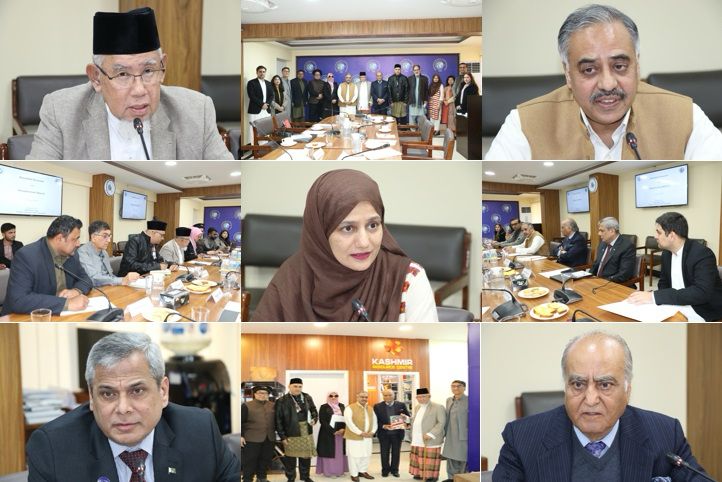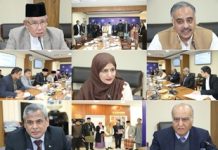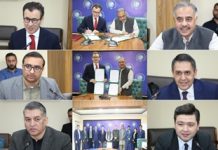Press Release
ISSI Hosts Roundtable on Kashmir with Malaysian Civil Society Delegation

The Institute of Strategic Studies Islamabad (ISSI) hosted a high-level delegation from the Malaysian Consultative Council of Islamic Organization (MAPIM), led by its President, Mr. Mohd Azmi Bin Abd Hamid. A roundtable discussion was organized to evaluate the current status of the global movement for Jammu & Kashmir and explore strategies to highlight India’s illegal occupation, its continued aggression against Kashmiris, and its denial of the right to self-determination, as enshrined in the UN Charter and relevant Security Council resolutions. The event was attended by academics, researchers, diplomats, human rights activists, and youth mobilizers working on the issue.
Dr. Khurram Abbas, Director of the India Study Centre at ISSI, welcomed the participants and introduced the visiting delegation.
In his remarks on the occasion, Director General ISSI Ambassador Sohail Mahmood applauded MAPIM’s commendable work under Mr. Azmi’s leadership in advocating for the causes of the Muslim Ummah, particularly Palestine and Kashmir. He acknowledged MAPIM’s efforts in drawing international attention to the plight of the Kashmiris and emphasized that the delegation’s visit to ISSI provided an opportunity to share insights as well as exchange views on the evolving global dynamics with reference to the Jammu and Kashmir dispute.
Ambassador Sohail Mahmood emphasized that the Jammu and Kashmir dispute must be examined through legal, human rights, and peace and security perspectives. Legally, he asserted that the Kashmiri people’s right to self-determination is enshrined in international law and UN resolutions, which India has historically evaded while now openly violating these obligations by claiming the territory as its ‘integral part.’ He also highlighted India’s attempts to misrepresent the Kashmiri freedom struggle as ‘terrorism’ and accelerate demographic changes post-August 5, 2019. On human rights, he highlighted widespread abuses, including prolonged curfews, enforced disappearances, extrajudicial killings, and the persecution of activists, journalists, and youth as part of its agenda to silence dissent and quell resistance in the occupied territory. From a security standpoint, he warned that this unresolved dispute remained the main obstacle in the way of sustainable peace in South Asia. He lauded Malaysia’s principled stance on the Kashmir cause and emphasized the need for greater collaboration among like-minded countries, including with in the Organization of Islamic Cooperation (OIC).
In his remarks, Mr. Mohd Azmi Abd Hamid highlighted that the MAPIM delegation’s visit was part of its broader efforts to mobilize resources and advocacy for the Kashmir issue. He noted that colonial powers had deliberately left behind unresolved disputes to internally weaken post-colonial societies. While the establishment of the United Nations had initially raised hopes for justice, its failure to resolve disputes like Kashmir and Palestine has raised serious concerns about its effectiveness.
Mr. Azmi reiterated Malaysia’s steadfast support for the Kashmir cause at both governmental and non-governmental levels. He suggested that, given shifting global dynamics, informal, people-centric approaches should be prioritized to sustain international attention on Kashmir. He emphasized the importance of action-oriented research and innovative solutions to create an enabling environment for resolving the dispute.
The discussion that followed reinforced the need for a community-oriented approach to the Kashmir issue, alongside active diplomatic efforts. Participants also stressed the importance of countering India’s misleading narrative and presenting the legal and historical realities of the dispute to the international community. Additionally, they highlighted India’s desire to alter Kashmir’s demography and erase its Muslim identity through acts of ethnocide and forced Hinduization and stressed the need for systematic efforts to effectively counter these Indian attempts.
The leadership of ISSI and MAPIM agreed to strengthen institutional collaboration and work closely on areas of mutual interest, particularly the Jammu & Kashmir issue. The roundtable concluded with a vote of thanks by Ambassador Khalid Mahmood, Chairman of the BoG, ISSI.











